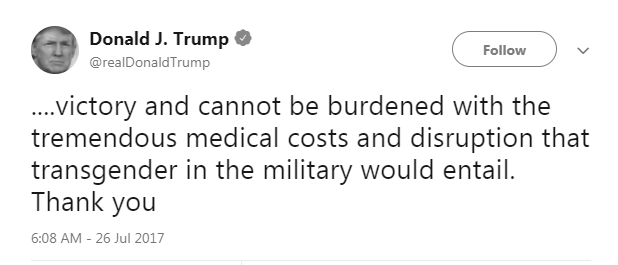Since Trump took office, the United States has dealt with many issues and various setbacks. One of the many controversial issues surrounding the Trump administration is whether or not we should allow troops who identify as transgender serve our country through military service. There have been many talks on this topic dating back to President Trump initially tweeting out the ban on transgender troops in 2017.
He had initially tweeted, “The United States Government will not accept or allow transgender individuals to serve in any capacity in the U.S Military.” He then went even further to say, “Our military must be focused on decisive and overwhelming victory and cannot be burdened with the tremendous medical costs and disruption that transgenders in the military would entail.” Obviously, “tremendous medical costs” isn’t enough of a reason for such a decision to be made. It isn’t surprising to me that people have been shocked and livid that a policy people have not only been working towards, but hoping for, is being destroyed.
Even though these tweets were released in July 2017, it was only this past month that a new, updated policy regarding transgender troops was announced. As reported online by CNN and other news outlets, the new policy says that “transgender persons with a history or diagnosis of gender dysphoria—individuals who the policies state may require substantial medical treatment, including medications and surgery—are disqualified from military service except under certain limited circumstances.” It’s also been reported that they believe people who are transgender, or have a history of gender dysphoria will present a “considerable risk to military effectiveness and lethality.” Despite this, it might take some time to see what happens as the military is still required to accept transgender individuals. Overall, it seems that it’s unclear where this may lead.
The new policy that’s been put into place seems to be vague and offers no solution to anyone who considers themselves a transgender troop. In the end, there is still a ban and the fact that there’s exception for people under “certain circumstances” is unsatisfying to hear. Regardless of there being new developments regarding transgender troops, it feels like there is no true solution and that as a country we’re taking many steps backwards. Just because someone may not identify with their assigned gender, doesn’t mean they should be prevented from exercising their ultimate right as an American citizen.
The main argument presented is that a person being transgender may present a risk. Being transgender may be a huge weight on someone’s mind and may present medical problems when it comes to gender reassignment surgery. A person’s decision on how they identify shouldn’t factor into if they’re allowed to serve their country or not. Each person should of course be examined mentally and physically, but deciding how they feel happiest shouldn’t be a deciding factor.
It doesn’t help that the new policy is not very clear to begin with. If there isn’t a clear solution, then what exactly is the initial problem? Some people believe that this is another act of discrimination that the Trump administration is enforcing on citizens. This belief is not hard to agree with. Based on their previous policies and actions, the discourse this new policy has brought to our society is not surprising. The way the initial ban was announced on a social media website was ridiculous. How are people supposed to take issues seriously when Twitter seems to be the only way we can check for updates? How are people supposed to take issues seriously when even after months we still don’t have a definite, clear definition as to what exactly is going on. Hopefully, as time moves on, we’ll be able to get more answers than can be given in a standard 140-character tweet.
Marlyn Silva
mhsilva@vwu.edu


